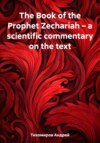Kitobni o'qish: «The Book of the Prophet Zechariah – a scientific commentary on the text»
Scientific commentary is given in parentheses after each verse.
Chapter 1
1 In the eighth month, in the second year of Darius, the word of the Lord came to Zechariah the son of Barachiah, the son of Adda, the prophet: (Verbal suggestion by a Jewish hypnotist. The prophet Zechariah began his activity in the second year of the reign of Darius (520 BC). BC), that is, he was a contemporary of the prophet Haggai. In the book that has come down to us, named after Zechariah, only the first part belongs to the pen of Zechariah, or Protozachariah (chapters 1-8). The second part of the book (chapters 9-14) is a collection of various prophecies , voiced at different times and collected and revised in the Hellenistic era (III-II centuries BC. They are usually designated as chapters of Deuteronomy).
2 The Lord was angry with your fathers with great anger, (The reason for the anger is the departure from the “true” religion. Yahweh is angry like an ordinary person).
3 And you shall say to them, Thus says the Lord of hosts: Turn to me, says the Lord of hosts, and I will return to you, says the Lord of hosts. (The priests of Judaism, through their prophets, “broadcast” to ordinary Jews what was beneficial for them – to lure the Jews by any means and make them their dumb slaves).
4 Do not be like your fathers, to whom the former prophets called before, saying, “Thus says the Lord of hosts: Turn from your evil ways and from your evil deeds.” but they did not obey and did not heed Me, says the Lord. (This means that the so-called “Lord of Hosts” did not know that this would happen, and if he knew, he staged a performance show).
5 Where are your fathers? and the prophets, will they live forever? (Question about unfaithful fathers and prophets).
6 But did not My words and My decrees, which I commanded My servants the prophets, comprehend your fathers? and they turned and said: “As the Lord of hosts determined to deal with us according to our ways and according to our deeds, so he did to us.” (Rule of talion. The priests of Judaism considered their prophets to be slaves).
7 On the twenty-fourth day of the eleventh month—this is the month of Shevat—in the second year of Darius, the word of the Lord came to Zechariah the son of Barachiah, the son of Adda, the prophet: (This is February 519 BC. The priests inspire with the word).
8 I saw at night: behold, a man on a red horse stands among the myrtle trees, which are in a depression, and behind him there are red, piebald and white horses – (Myrtle is a genus of evergreen shrubs and trees of the myrtle family. The horses symbolize a certain message. The original says: not on a red horse, but on a red one. Like Haggai, Zechariah apparently perceived the turbulent events of the first two years of Darius’s reign as sure indications of the approach of the “last day” and the advent of the messianic kingdom. But by 519 BC. BC Darius managed to restore calm in most of his power and deal with uprisings. Echoes of these events can be seen already in the first prophecy of Zechariah).
9 And I said: Who are they, my lord? And the angel who spoke to me said to me: I will show you who they are. (Messenger of the priests – the angel explains to the prophet what this means).
10 And the man who stood among the myrtle trees answered and said, “These are the ones whom the Lord has sent to go around the earth.” (A certain man answers; the envoys inspected the subject lands).
11 And they answered the Angel of the Lord, who stood among the myrtle trees, and said: We have walked around the earth, and behold, the whole earth is inhabited and quiet. (A whole troupe of actors was used for this hypnosis session, which reported that the population was not rioting).
12 And the Angel of the Lord answered and said: Lord Almighty! How long will You not have mercy on Jerusalem and on the cities of Judah, against which You have been angry for these seventy years? (The priests of Judaism have lost their apologists in the person of the “chosen people”, and therefore they influence the prophets, with the goal that the prophets influence the “chosen ones” in order to return them to the fold of the “true” religion, which has been going on for 70 years, in fact The Babylonian captivity, even for those who were taken away for the first time in 597 BC, lasted not 70, but 58 years: from 597 to 539 BC).
13 Then in answer to the angel who spoke to me, the Lord spoke good words, words of comfort. (Mr. God, that is, the secret priest-hypnotist, “broadcasts”).
14 And the angel who spoke with me said to me: Proclaim and say: Thus says the Lord of hosts: I was jealous for Jerusalem and for Zion with great jealousy; (The transmission of words from the Lord God comes through his messenger angel; the Lord of Hosts, just like an ordinary person, became jealous. This means that the so-called Lord God did not know that this would happen, and if he knew, then this is a show performance!) .
15 And I am indignant with great indignation against the nations that live in peace; for when I was little angry, they increased the evil. (Mr. God expresses purely human qualities and emotions: indignation, anger, jealousy. This means that this is an ordinary angry person! The believers left him without food, so he went away).
16 Therefore thus says the Lord: I turn to Jerusalem with mercy; My house will be built in it, says the Lord of hosts, and a surveying line will stretch across Jerusalem. (In the book, the teaching is presented in the form of apocalyptic visions. They contain all the necessary attributes of the apocalypse: four horsemen announce the fall of evil and the exaltation of the righteous, four broken horns symbolize the destruction of the enemies of Israel, the appearance of a husband with a surveying rope predicts the restoration of Jerusalem, a golden lamp with two olives emphasizes the special significance of the rank of king and priest in the kingdom of the messiah; the flying scroll is identified with the eradication of sin in the kingdom of the messiah).
17 Proclaim again and say: Thus says the Lord of hosts: My cities will again overflow with good things, and the Lord will comfort Zion, and will choose Jerusalem again. (Jerusalem and its main hill Zion will again restore their power).
18 And I lifted up my eyes and saw, behold, four horns. (How could it be without horns!).
19 And I said to the angel who spoke with me: What is this? And he answered me: These are the horns that scattered Judah, Israel and Jerusalem. (The two pairs of horns symbolize Egypt and Babylon.)
20 Then the Lord showed me four workmen. (The Angel and the Lord show and say something, just like ordinary people).
21 And I said, “What are they going to do?” He told me this: these horns have scattered Judas, so that no one can lift up his head; and these came to frighten them, to knock down the horns of the nations, who lifted up their horn against the land of Judah to scatter it. (The workers will destroy other people’s horns. Their horns are knocked off – apparently, a hint of Darius’s suppression of the uprising in these countries. Now their peoples are at peace. And Yahweh, that is, the top of Judaism, is still without his “home”. This is the concern of the Judaic priests ).
Chapter 2
1 And again I lifted up my eyes and saw: behold, a man with a surveying rope in his hand. (The surveying rope symbolized the restoration of ownership of the lands).
2 I asked: where are you going? and he said to me: measure Jerusalem, to see what is its breadth and what is its length. (For measuring Jerusalem).
3 And now the Angel who spoke to me comes out, and another Angel comes to meet him, (a whole host of messenger angels).
4 And he said to this: Go quickly and tell this young man: Jerusalem will populate the surrounding area because of the multitude of people and livestock in it. (Angels broadcast through the prophet, and not directly; apparently, this angel received this information from circles close to the Persian court).
5 And I will be to him, says the Lord, a wall of fire around him, and I will be glorified in the midst of him. (The priests of Yahweh rejoice.)
6 Hey, hey! flee from the north country, says the Lord: for I have scattered you to the four winds of the heavens, says the Lord. (The Jews found themselves in a scattered position, as they were evicted from Israel and Judea, but now the priests of Judaism are calling for fleeing Babylonia – the “northern country”).
7 Save yourself, O Zion, who dwells among the daughters of Babylon. (Yahweh, that is, the knowledgeable elite of Judaism, undoubtedly means the Jews who did not want to leave Babylon and return to their homeland).
8 For thus says the Lord of hosts: For glory He sent Me to the nations that plundered you, for whoever touches you touches the apple of His eye. (Yahweh protects his people and will take revenge on those nations who robbed the Jews).
9 And behold, I will lift up My hand against them, and they will become the prey of their servants, and then you will know that the Lord of hosts has sent Me. (Retribution is inevitable!).
10 Rejoice and be glad, daughter of Zion! For, behold, I will come and dwell in your midst, says the Lord. (Yahweh will triumph).
11 And many nations will flee to the Lord in that day, and they will be My people; and I will dwell in your midst, and you will know that the Lord of hosts has sent Me to you. (Yahweh will triumph).
12 Then the Lord will take possession of Judah, His inheritance in the holy land, and will choose Jerusalem again. (Yahweh will triumph).
13 Let all flesh be silent before the Lord! For He rises from His holy habitation. (Yahweh will triumph).
Chapter 3
1 And he showed me Jesus the great priest standing before the angel of the Lord, and Satan standing at his right hand to oppose him. (Priest (Greek) is the same as a priest. The Angel of the Lord is a supporter of the secret priest, Satan is the enemy of the secret priest).
Bepul matn qismi tugad.










